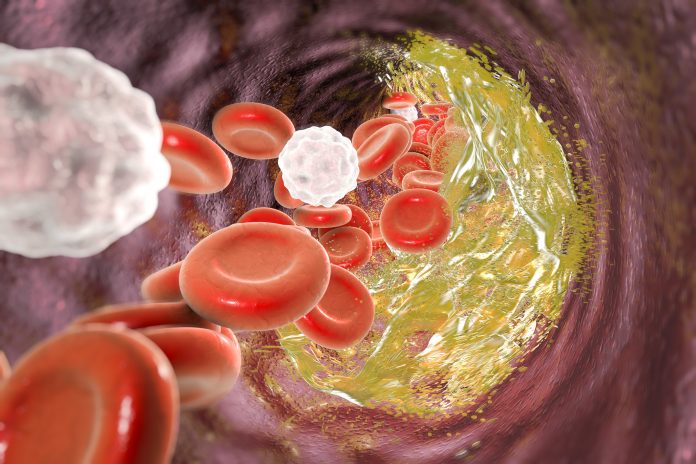
A molecule known as resolvin T4 (RvT4) could help treat patients with rheumatoid arthritis-associated atherosclerosis in the future, according to research led by Queen Mary University of London.
Between one and two million people in the U.S. have the degenerative autoimmune joint condition rheumatoid arthritis. Like many autoimmune conditions, people with rheumatoid arthritis have a number of associated health problems including being more susceptible to cardiovascular diseases such as atherosclerosis.
“Atherosclerosis is characterized by the accumulation of lipids, macrophages, and fibrotic elements in the intima of large arteries at sites of low or disturbed flow. This accumulation results in the formation of atherosclerotic plaques that in most cases are silent with limited clinical consequence,” explained Jesmond Dalli, a professor at the William Harvey Institute, Queen Mary University of London, and colleagues in the journal Nature Communications.
“However, in some instances, altered macrophage responses with ensuing excessive lipid accumulation and defective efferocytosis lead to the formation of a necrotic core and a thin fibrous cap. This results in unstable plaques that rupture, causing ischemic cardiovascular disease and even death.”
In this preclinical study, Dalli and colleagues used a mouse model of rheumatoid arthritis to study this kind of atherosclerosis and investigate potential treatments.
Recent research suggests patients with inflammatory conditions such as rheumatoid arthritis have lowered or defective activity of protective “mediator” molecules that normally help to keep excessive immune reactions under control. For example, resolvins such as RvT4. It is thought that these mediator molecules could help prevent or treat conditions such as atherosclerosis.
“The potential relevance of RvTs in regulating vascular disease is supported by findings made in recent studies where administration of highly purified eicosapentaenoic acid, the precursor of n-3 docosapentaenoic acid, together with statins reduced incidence of ischemic events in patients with high triglycerides,” write the authors.
Dalli and team first looked at the role of the larger group of 13-series resolvins (RvTs) in the model mice to assess their function. They found that RvT4 was greatly reduced in animals with rheumatoid arthritis who also had atherosclerosis.
When RvT4 was given to these mice, blood vessel inflammation dramatically decreased. The researchers found this was due to RvT4’s ability to reprogram a type of white blood cell called a macrophage and trigger release of stored lipids from the blood vessel walls.
“The study is important because it identifies for the first time the loss of RvT4 production as a potential new cause of blood vessel inflammation in the context of arthritis, offering a mechanistic explanation on the cause of this important disease in rheumatoid arthritis patients,” said Dalli in a press statement.
“It also showed that RvT4 restores the biological activities of lipid loaded macrophages by promoting lipid breakdown and efflux from the cells, an observation that can guide the development of new treatments to limit the incidence and/or severity of cardiovascular disease in patients with rheumatoid arthritis.”